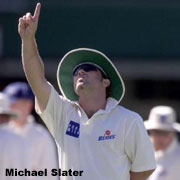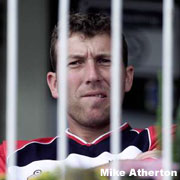Dare to wear black!
Prem Panicker
After two days of unprecedented emotionalism, maybe it is time to take stock of the situation precipitated by Mike Denness at Port Elizabeth, and see where we stand.
So where do we stand? The short answer is -- precisely where we started from.
One Indian player is a cheat. That label stays. Five Indian players are guilty of bringing the game into disrepute. That judgement stays. And Mike Denness -- the judge in question -- stays, too, despite the Indian board's demand that he be replaced for the upcoming third Test.
 We all know the arguments. We know that the actions of Mike Denness were in fact against the processes laid down by the International Cricket Council in such cases. But what of that? The ICC is backing Mike Denness, and the ICC says no appeal is possible, and that is that -- no matter how many schoolchildren take to Indian streets, no matter how many Indian parliamentarians protest, the labels Mike Denness has chosen to stick on various Indian players adheres to them -- and will so adhere, for the rest of their playing careers.
We all know the arguments. We know that the actions of Mike Denness were in fact against the processes laid down by the International Cricket Council in such cases. But what of that? The ICC is backing Mike Denness, and the ICC says no appeal is possible, and that is that -- no matter how many schoolchildren take to Indian streets, no matter how many Indian parliamentarians protest, the labels Mike Denness has chosen to stick on various Indian players adheres to them -- and will so adhere, for the rest of their playing careers.
While on that, will someone please explain to me the difference between the Taliban and the ICC? The Taliban takes people out onto a football field and summarily executes them -- the ICC does so, through its match referee, on a cricket field. The Taliban never explains its verdicts, and the ICC never explains its verdicts, either. There is no appeal against a Taliban sentence, and there is no appeal against an ICC verdict.
Perhaps it is time to suggest that once US President George W Bush is through with his preoccupations in Afghanistan, he could divert the odd fighter-bomber to the ICC headquarters.
But let us leave this, too, lie.
Let us, while we are about it, quit getting side-tracked by every fresh statement that is being made on the issue. I notice from the mailbox that readers have got het up over Steve Waugh suggesting that Denness was right to take action against Tendulkar.
 Why bother wasting any emotional energy on the man? When Michael Slater first claimed a bump-catch, then argued with the umpire and demanded the third umpire's verdict, when the third umpire gave the batsman the green light and Slater abusively questioned that decision as well and McGrath joined in with his own highly specialised vocabulary, Steve Waugh stood right next to them and looked on.
Why bother wasting any emotional energy on the man? When Michael Slater first claimed a bump-catch, then argued with the umpire and demanded the third umpire's verdict, when the third umpire gave the batsman the green light and Slater abusively questioned that decision as well and McGrath joined in with his own highly specialised vocabulary, Steve Waugh stood right next to them and looked on.
He could afford to, because he knows that he will never be fined 75 per cent of his match fee and suspended for a game -- that honour is reserved for the likes of Sourav Ganguly who, standing at mid off, was supposed to have stopped Sehwag going up in appeal at silly point after taking what he thought was a fair catch.
Steve Waugh suggests that it is time the ICC got tough on rule breakers and cheats -- and why wouldn't he? It would be churlish on our part to point out that when his twin, Mark Waugh, confessed to taking money from a bookmaker, Steve Waugh was not similarly perturbed, Steve Waugh's heart did not go boom as loudly for truth and justice.
But frankly, none of this is relevant. It is time we woke up to the knowledge that we have a problem. A very big one. Indian cricketers are, and always will be, guilty until proved innocent. Because, you see, in the eyes of the body that runs international cricket, our word has no value. (Our money has value, but that is a different story.)
Examine the Denness incident, and you will know why. Tendulkar was seen, on camera, doing something. Denness summoned the player and questioned him. Tendulkar told the match referee that he had been cleaning the seam of dirt. Denness decided that Tendulkar was a liar, as well as a cheat. And that was that.
Contrast this, if you like, with an incident dating back to 1994. Michael Atherton, captain of England, is seen on camera taking something out of his pocket and rubbing it on the ball, in course of a home series against South Africa. He is summoned by match referee Peter Burge -- and in response to the latter's question, Atherton says that there was nothing in his pocket.
 It turns out that he was lying. So Atherton is summoned again, and this time, he says that he had kept some dirt in his pocket, to clean the ball with. Firstly, with all the dirt lying around on a field, it stretches credulity to be told that someone felt the need to pocket a bit of real estate. Secondly, even if it was dirt, the rule is very clear -- you cannot use any substance on the ball, period.
It turns out that he was lying. So Atherton is summoned again, and this time, he says that he had kept some dirt in his pocket, to clean the ball with. Firstly, with all the dirt lying around on a field, it stretches credulity to be told that someone felt the need to pocket a bit of real estate. Secondly, even if it was dirt, the rule is very clear -- you cannot use any substance on the ball, period.
But Mike Atherton -- the man who in his first interview with the match referee lied -- is let off. The match referee says that the video evidence was reviewed, Atherton was asked for an explanation, he gave one, and his word was accepted.
This instance is a clear parallel to what happened with Tendulkar. In both instances, the camera is the first to spot something. In both instances, the match referee summons the concerned players. In one instance, a player says one thing first, then another -- and even his second explanation is a violation of the rules. The other player has one simple explanation, which he renders. Guess who gets off scot free and who gets it in the neck?
So it is, and so it will remain. Atherton is, after all, an English gentleman, educated at Oxbridge -- the word of such is always sacrosanct. Even when every word is a lie.
This is the reality we have to face, and learn to live with -- Indian cricketers will always be suspect, Indian cricketers are always guilty unless proven innocent (and sometimes, not even then).
So let us learn to accept it, for starters. And let us start doing something about it.
What can we do? The obvious is to refuse to play the third Test -- but think about it for a moment, and you will realise that it accomplishes nothing. Worse, the ICC can use that excuse to take disciplinary and suspend the whole team (all 15 players) for anywhere between one to three Tests.
Why give them the chance?
But that does not mean we are helpless, that there is nothing we can do. There is -- plenty.
Firstly, from here on, until and unless the stigma surrounding the players is cleared, every member of the Indian team taking the field in any international should wear black armbands, as a constant reminder to the cricket world of their "crimes". If possible, get the words 'I am a crook!' etched onto the armbands -- and by wearing these armbands, mock the decisions of Denness and the ICC every single time you step onto the field.
Next, Sourav Ganguly -- the captain who finds himself in the dock for "failing to control his team" -- should tell his players that here on in, no Indian player will ever appeal. I mean, how else can he "control the team", as the ICC wants him to? At best, if the bowler gets a batsman on the pad, or finds an edge that is held, the player who takes the catch will hold the ball up, and the bowler will turn politely to the official and ask, in soft tones "Umpire?"
Silence is a very big weapon -- it is time the players began to use it.
There could be an argument that in the heat of battle, the appeals and such are a way of releasing adrenalin. The heck with that, a better way of releasing adrenalin is by channeling it into the ball you are going to bowl, into the chase you give as you go after a shot, into the concentration you bring to your close fielding, into the focus you bring to the job of demolishing the opposition's bowlers.
In the same vein, the team should, here on in, refuse to accept any individual awards from anyone. The captain should make a statement -- once -- to the effect that since the team has been deemed, en masse, to have brought disrepute to the game, the players do not believe that they deserve the honour of being named man of the match, or whatever.
You don't honour a crook, do you?
By way of rubbing the message in further, the team should from here on in make the umpires do their work for them. After a ball is bowled, do not relay it back to the bowler via mid off and mid on -- throw it to the umpire instead. Let him examine the ball, satisfy himself, and then let him give it to the bowler. If the ball needs cleaning, toss it to the umpires, let them do the cleaning and if you are not satisfied, toss it back at them till they have got it right.
And finally, the team can stop taking things lying down. I was appalled to see, on day five at Port Elizabeth, Nantie Hayward abuse Sachin Tendulkar.
No, I was not appalled that Hayward used foul language -- you expect that, as a matter of course, from teams like South Africa, Australia, New Zealand et cetera.
They are merely professionals with a passion to excel and to win, players who play the game hard. It is only Indians and the like who are badly brought up boors who bring the game into disrepute.
What shocked me was the way Tendulkar handled it -- without protest. And when the curtain came down on the game, and Hayward came up to put a hand around Tendulkar's shoulders and smile and joke, Tendulkar smiled and joked right back.
Stop that, for god's sake -- and learn to stand up for yourself.
The next time an Indian player is abused on the field of play, he needs to immediately halt play, summon his manager out into the middle, and complain, in the presence of the two umpires.
The manager then needs to go back into the dressing room, write out a report, accompany it with the appropriate video clip, and hand it over to the match referee -- and simultaneously, alert the media that he has done so (after all, if Denness can leak the news of action about to be taken, there is no reason the team manager should not similarly use the media to build pressure).
Equally, the team manager needs to start earning his money. Too often, you see the manager sitting in the pavilion, relaxed and at his ease and completely unconcerned with what is going on out in the middle.
That needs to stop. The manager needs to focus on the field as intently as the players and the coach. Every single violation by the opposition, every intimidatory appeal, every instance of abuse, needs to be noted down, and formally complained against. And every complaint needs to be monitored by the media, every decision of the match referee scrutinised, and reported.
In other words, it is time to direct the heat where it belongs -- on those who systematically bring discredit to the game, but get off scot free because the ICC and its tame hatchetmen do not have the integrity to take action on their own.
Time and again, the Indian team has found itself on the receiving end of decisions that are shockingly callous. Time and again, the media has whipped itself into a frenzy over these decisions. Time and again, the next game has wiped out from our minds the memories of the latest affront.
And that is precisely what the Mike Dennesses of this world bank on, when they hand out such atrocious sentences, and then hide behind a wall of silence. They know -- every Tom, Dick and Mike on the ICC panel -- that we will make a fuss, write off furious letters to whoever we can think of, and after 48 hours, 72 at best, we will forget all about it.
Change that around. It is time to show the ICC that we have had enough -- that here on, we will neither forget, nor forgive.
And it is not the media, nor the fans, who can do that -- we can only back our team to the limit. Action, if it is to be taken, has to be taken by the team.
The ball tampering issue
Read also: Mike Denness, put up or shut up!
India's tour of South Africa: Complete coverage